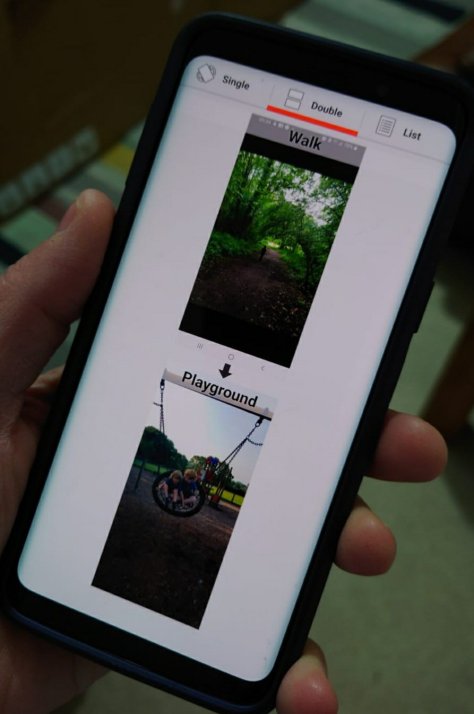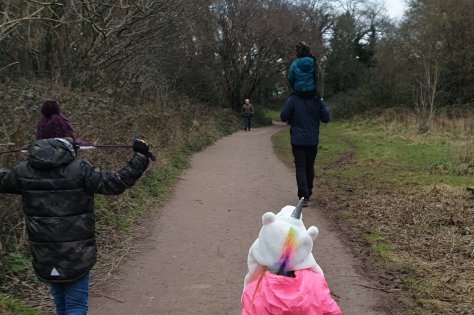“You get the coats, boots and hats ready, and I will do the toilet trips” I said. It was the standard pre-walk preparation we executed every week.
As we all bustled in the small cramped hallway at the bottom of the stairs, with coats consuming arms and hats bobbing up and down as the pompoms got excited for their daily trip out, one little boy was missing.
I looked around the doorway to see my son, Rhys sitting by the window with his book in his hand.
“Rhys, walk then swings” I said as I walked up to him.
“NO!” he screamed back at me, and kicked out, turning into a stiff board that would not be moved.
I immediately pulled out my phone from my back jean pocket, knowing I had to move quickly before anything escalated to a point of no return. I searched frantically through my picture app for what I wanted, but my heart was beating in my stomach. I hoped I had the right images. Images I hadn’t used in years, for a routine we had got so use to executing.
Rhys’ screams and frustration got louder as I finally found a picture of him walking through the forest and a picture of the park. I pulled the two pictures into a sequence, and held them up to him. “Walk then swings” I said, trying to keep calm and consistent with my tone, while the stress built up in my gut.

Rhys reluctantly acknowledged me and I was able to convince him out of the front room towards the front door. The rest of the family stood congregated and patiently waiting for us as I bent down to place each one of Rhys’ wellies on his feet. I was so nervous this would not go to plan, so I moved carefully and gently to try and ensure we were able to move forward and get out for the weekly walk. I held out Rhys’ coat, and he pushed each of his arms into their slots, leaving me to pull the zip up over his body.
I took a deep breath, and placed my hand on the front door, opening it and feeling the cold winter air rush past my bare face. Things happened in slowmotion at first and then it was as if someone had pushed the fastforward on our lives.
Rhys’ hand lifted upwards, grabbed the zip of his coat and pulled. His arms were out of the sleeves within seconds and he ran to the back room kicking out his feet in an attempt to eject the boots from his limbs.
I felt deflated. I felt like we had gone back in time by three years, to a time when this was a daily occurrence. A time when we couldn’t go anywhere. A time when I couldn’t cope.
“Do you want to stay here, and I will take these two?” said Justin, nodding to Jessie and Ewan who stood suited and booted on either side of him.
“Yes, you go” I said.
As half my family left and the door closed behind them, I felt my heart rip apart. We were divided once again, just like we had been years ago when we couldn’t take Rhys anywhere. Where places and activities were too much to cope with.
I walked into the back room. Rhys was sitting on the single sofa, his wellies still on his feet unable to be removed by his small hands. I knelt down by him and pulled each welly from its foot.

“Rhys, swings?” I asked, in hope that I could at least get him out the house, even if it still meant no family walk and just a trip to the playground.
Rhys just sat staring at me.
I grabbed my phone again and quickly googled ‘swings’, and held up a picture of a child on a swing. The image filled the screen of my phone.
No response.
I left the room and found his trainers. Returning to the room, I held up the picture on my phone once again. “Rhys, swings?” I said again, and then held up his trainers. My hope was fading so quickly, and I just wanted to collapse down in tears. Our life was so challenging, where a simple walk was just an impossible task.
But I held strong. I was desperate to try and find a way.
As I continued to show him the swing picture and meet him at his eye level, he suddenly let me slowly place each trainer on his foot, and with a “one, two, three” I lifted him to him to his feet.
“Swings, Rhys?” I asked again.
“Swings!” suddenly came a response.
I carefully put on his coat, my stomach in knots as the stress bringing a taste of sick into my throat,but we somehow managed to walk out the front door. At the end of the driveway, I went to turn left to take us up to the park, but Rhys stopped. “This way!” he said, pulling my hand to the right.
“Ok” I replied and let him take the lead, while I dug into my coat for my phone.
“Justin, wait for us, we are coming!” I shouted as my husband answered my call.

Five minutes later we had caught up with the rest of our family, and I collapsed into my husband’s arms, my body drained of energy, the stress and exertion of effort to get to where we were.
“I don’t know how you did it, but well done” he said, as he slowly wiped something out of his eye. We stood in the field for a few minutes as I got some of my strength back, then we walked forward. We walked onwards as a family, together again.
“I can’t go back to where we were” I said, “we have worked so hard at this”
“We definitely have” my husband responded ” We definitely have.”
As we walked forward, I watched Rhys run ahead. He must have felt as drained as me, but I knew a walk and some fresh air was what we all needed. It had been challenging, but our family walk was all we had at the moment. The only thing to keep us moving forward.


